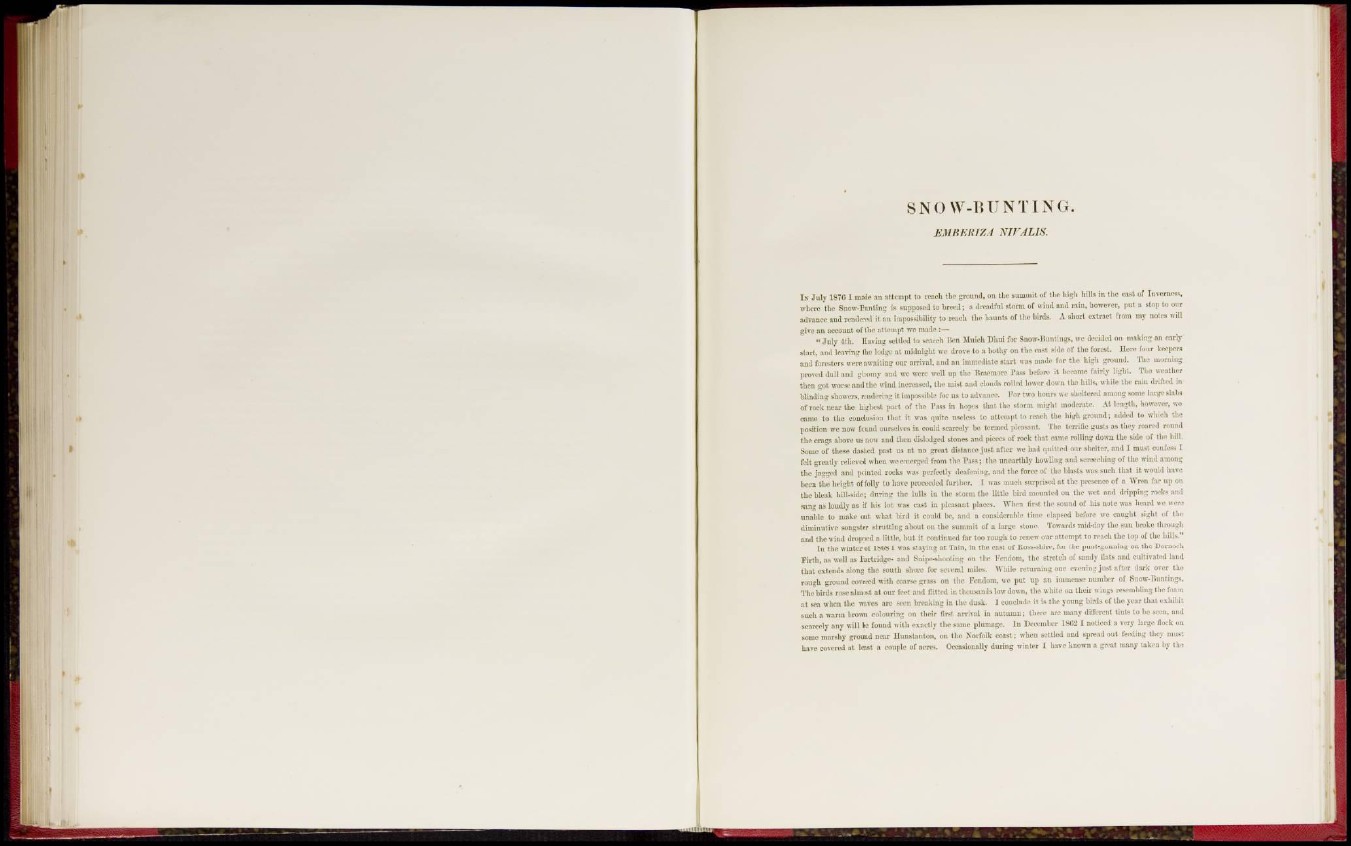
S N O W - B U N T I N G .
EMBERIZA NIVALIS.
IN July IW7(i I made an attempt to roach tlie ground, on the summit of the Ugh bOJl in tlie east ol Inverne..,
where the Snow-Bunling Is Wlppillll lo hreed; a neesMJfal storm of wind anil rain, however, put a slop to our
advance and rendered it an impossibility to reach (he haunts of the birds. A short extract from my notes will
give an account of the attempt we made :—
" July llh. Having settled to search lien Muic.li Biiui for Snow-Huntings, we decided on making an earlystart,
and leaving the lodge at midnight we drove to a bothy on the cast side of the forest. Hen four keepers
and foresters were awaiting our arrival, and an immediate start was made for the high ground. The morning
proved dull and gloomy and we were well up the Hraemore Bass before it became fairly light, The weather
then got worse and the wind increased, the mist ami clouds rolled lower down the hills, while the rain drilled in
blinding siniwITS. rendering it imp i--ible for us to advance. For two hour- no sheltered among -ome large slain
of rock near the highest part of the Pass in hopes that the storm might moderate. At length, however, wo
came to the conclusion that it was quite useless to attempt to reach the high ground; added to which the
position we now found ourselves in could scarcely hi' termed pleasant. The terrific gusts as they roared round
the crags above us now and then dislodged stones and pieces of rock that came rolling duwu the side of the hill.
Some of these dashed past us at no sreat distance just after we had quilled our shelter, and I must confess I
felt greatly relieved when weemcrged from the Pass; the unearthly howling and screeching of the wind among
the jagged and pointed rocks was perfectly deafening, and the force of the blasts was such that it would here
been the height of folly to have proeced.il further. I was much surprised at the presence of a Wren far up on
the bleak hill-side; during the lulls in the storm the little bird mounted on the wet and dripping rocks and
sang as loudly as if his lot was cast in pleasant places. When first the sound of his note was heard we were
unable to make out what bird it could IK1, and a considerable time elapsed before wo caught sight of the
diminutive songster strutting about on the summit of a large stone. Towards mid-day the sun broke through
and the wind dropped a little, hut it continued far too rough to renew our attempt to reach the top of the hills."
In the winter of 1SC8 I was staying at Tain, in the east of Boss.shire, for the punt-gunning on the Dornoch
Firth, as well as Partridge- and Snipe-shooting on the Fcndom, the stretch of sandy llats and cultivated land
that extends along the south shore for several miles. While returning one evening just after dark over the
rough cround covered with coarse grass on the Fcndom, we put up an immense number of Snow-Buntings.
The birds rose alnuist at our feet and Bitted in thousands low down, the w bite on their w ings resembling the foam
at sea when the waves are seen breaking in the dusk. I conclude it is the young birds of the year that exhibit
such a warm brown colouring on their first arrival in autumn ; there are many deferent tints to be seen, and
scarcely any will be found with exactly the same plumage. In December IM12 I noticed a very large llock on
some marshy ground near Hunstanton, on the Norfolk coast, when settled and spread out feeding they must
have covered at least a couple of acres. Occasionally during winter 1 have known a goat many lukeu by the